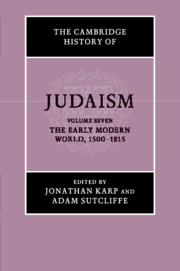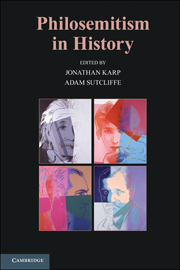27 results
The Jewish Economic Elite: Making Modern Europe. By Cornelia Aust. Bloomington: Indiana University Press, 2018. xxxii, 217 pp. Appendix. Notes. Bibliography. Index. Illustrations. Figures. Tables. Maps. $30.00, paper.
-
- Journal:
- Slavic Review / Volume 79 / Issue 1 / Spring 2020
- Published online by Cambridge University Press:
- 11 May 2020, pp. 191-192
- Print publication:
- Spring 2020
-
- Article
- Export citation
Introduction
-
-
- Book:
- The Cambridge History of Judaism
- Published online:
- 10 November 2017
- Print publication:
- 16 November 2017, pp 1-12
-
- Chapter
- Export citation
Additional material
-
- Book:
- The Cambridge History of Judaism
- Published online:
- 10 November 2017
- Print publication:
- 16 November 2017, pp xiii-xvi
-
- Chapter
- Export citation
Part II - Themes and Trends in Early Modern Jewish Life
-
- Book:
- The Cambridge History of Judaism
- Published online:
- 10 November 2017
- Print publication:
- 16 November 2017, pp 199-734
-
- Chapter
- Export citation
Part I - The World of Early Modern Jewry, c. 1500–1650
-
- Book:
- The Cambridge History of Judaism
- Published online:
- 10 November 2017
- Print publication:
- 16 November 2017, pp 13-198
-
- Chapter
- Export citation
Chapter 40 - Toleration, Integration, Regeneration, and Reform
- from Part III - The Jewish World, c. 1650–1815
-
-
- Book:
- The Cambridge History of Judaism
- Published online:
- 10 November 2017
- Print publication:
- 16 November 2017, pp 1058-1088
-
- Chapter
- Export citation
Dedication
-
- Book:
- The Cambridge History of Judaism
- Published online:
- 10 November 2017
- Print publication:
- 16 November 2017, pp v-vi
-
- Chapter
- Export citation
Part III - The Jewish World, c. 1650–1815
-
- Book:
- The Cambridge History of Judaism
- Published online:
- 10 November 2017
- Print publication:
- 16 November 2017, pp 735-1110
-
- Chapter
- Export citation
Index
-
- Book:
- The Cambridge History of Judaism
- Published online:
- 10 November 2017
- Print publication:
- 16 November 2017, pp 1111-1136
-
- Chapter
- Export citation
Figures
-
- Book:
- The Cambridge History of Judaism
- Published online:
- 10 November 2017
- Print publication:
- 16 November 2017, pp xi-xii
-
- Chapter
- Export citation
Copyright page
-
- Book:
- The Cambridge History of Judaism
- Published online:
- 10 November 2017
- Print publication:
- 16 November 2017, pp iv-iv
-
- Chapter
- Export citation
Contents
-
- Book:
- The Cambridge History of Judaism
- Published online:
- 10 November 2017
- Print publication:
- 16 November 2017, pp vii-x
-
- Chapter
- Export citation

The Cambridge History of Judaism
-
- Published online:
- 10 November 2017
- Print publication:
- 16 November 2017
PART V - PHILOSEMITISM IN POST-HOLOCAUST EUROPE
-
- Book:
- Philosemitism in History
- Published online:
- 05 June 2012
- Print publication:
- 21 March 2011, pp 287-288
-
- Chapter
- Export citation
Introduction
-
-
- Book:
- Philosemitism in History
- Published online:
- 05 June 2012
- Print publication:
- 21 March 2011, pp 1-26
-
- Chapter
- Export citation
Notes on Contributors
-
- Book:
- Philosemitism in History
- Published online:
- 05 June 2012
- Print publication:
- 21 March 2011, pp vii-viii
-
- Chapter
- Export citation
3 - The Philosemitic Moment?
-
-
- Book:
- Philosemitism in History
- Published online:
- 05 June 2012
- Print publication:
- 21 March 2011, pp 67-90
-
- Chapter
- Export citation
PART IV - AMERICAN PHILOSEMITISMS
-
- Book:
- Philosemitism in History
- Published online:
- 05 June 2012
- Print publication:
- 21 March 2011, pp 209-210
-
- Chapter
- Export citation
PART I - MEDIEVAL AND EARLY MODERN FRAMEWORKS
-
- Book:
- Philosemitism in History
- Published online:
- 05 June 2012
- Print publication:
- 21 March 2011, pp 27-28
-
- Chapter
- Export citation

Philosemitism in History
-
- Published online:
- 05 June 2012
- Print publication:
- 21 March 2011



